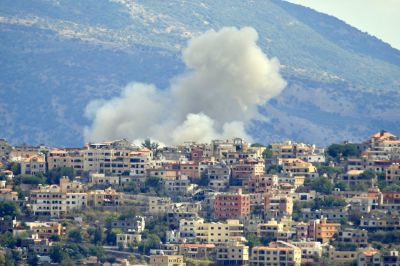Lebanon: Prove to world you're more than Hezbollah

For decades, efforts to engage with Christian communities across the Near East have revealed both the tragedies and triumphs of the region. From Israel to Iraq, Egypt, Armenia, and Lebanon, the challenges faced by these communities are immense. Yet, among all these hardships, the plight of Lebanon — especially its Christian population — remains one of the most heartbreaking. Once known as the Paris of the Middle East, Lebanon has been caught in a relentless cycle of violence and instability that began with its 15-year civil war — a conflict that, in many ways, never truly ended. That civil war may have finally come to a close just a few days ago, half a century after it began.
Lebanon's long history of conflict reached its nadir with the creation of Hezbollah, an Islamist militant group founded by Iran in the midst of the Lebanese civil war. What began as an Iranian-backed Shia militia soon grew into a monstrous force that spread violence far beyond Lebanon's borders. Hezbollah's list of atrocities is long, and its victims are diverse: from hundreds of American Marines murdered in Beirut in 1983, to diplomats, journalists, aid workers, and civilians caught in the group's crosshairs. Hezbollah's reign of terror has left deep scars on Lebanon, casting a shadow over its Shia community, which Hezbollah claims to represent but has instead exploited for its own ideological and strategic gain.
In recent weeks, Israel has taken decisive action in a series of historic military campaigns to address the long-standing threat the organization poses to regional stability. In just a few weeks, Israel has completely destroyed the command structure of Hezbollah, as well as reduced its weapons stockpile by about 50%. Israel has conducted these decapitation campaigns with an extraordinary level of precision and restraint, adhering to the highest standards of international law even while facing existential threats to its own people. The supply chain and technological feat of causing thousands of beepers and walkie-talkies to explode in the hands of Hezbollah terrorists will likely go down as one of the most precise, discriminate attacks in the history of warfare.
The significance of this cannot be overstated: while Hezbollah has used Lebanon's civilians as human shields, Israel has been scrupulous in its targeting, doing everything in its power to minimize collateral damage while achieving its military objectives.
And on Friday, Israel finally accomplished something that could truly reshape the Near East: the killing of Hezbollah's leader, Hassan Nasrallah.
With his death, Lebanon now has a rare opportunity for a fresh start — a chance to move beyond its long association with Hezbollah and towards the kind of peaceful and prosperous future that seemed impossible during the long years of war. The moment is ripe for what Abraham Lincoln, during America's own civil war, called "a new birth of freedom."
However, this opportunity would not have been realized without concerted efforts, especially from Lebanon's Shia community. Hezbollah has long wrapped itself in the cloak of sectarianism, presenting itself as the defender of Shia interests while acting as a proxy for Iran's regional ambitions. For too long, Hezbollah has monopolized the political and military power of Lebanon's Shia, leaving the community isolated and vilified by much of the world. But Hezbollah's influence does not — it must not — define Lebanon's Shia population.
Now is the time for Lebanese from all walks of life to seize this moment granted to them by Israel and demand a new path for their country. The Shia community holds a unique responsibility. Rather than seeking revenge for the death of Nasrallah, this community can instead pursue a path of peace and reconciliation. This is a moment when Lebanon's Shia can break free from Hezbollah's stranglehold, embrace national unity, and work towards rebuilding a country that has been held hostage by warlords and militias for far too long.
If they do, the rewards will be immense. Lebanon has always had the potential for prosperity; Lebanon could transform into a regional hub of commerce, culture, and innovation. But for this to happen, Lebanon's people must take ownership of their future. They must reject the politics of division and violence and instead build a society that is inclusive, just, and accountable.
For 10 years, the Philos Project has worked alongside our partners, often at great personal risk, to promote peace and understanding in Lebanon. We have met with leaders, officials, and activists in America and Israel, urging them to see beyond the violence of Hezbollah and recognize the rich, complex tapestry of Lebanese society. We have believed in Lebanon's potential even when it seemed hopeless. We have risked looking foolish — repeatedly — because we knew that peace was worth pursuing, no matter how elusive it seemed.
Now is the time for the Lebanese people to prove that our faith in them was not misplaced. It is time for them to show the world that Lebanon is more than Hezbollah, more than the civil war, and more than the violence that has plagued its streets for so long. The opportunity is here. But it will require courage, vision, and a commitment to peace that transcends sectarian lines.
As Bernard Henri-Lévy recently wrote on X, Lebanon is not on the brink of collapse, but on the brink of "relief and deliverance." With bold action, Lebanon can become more prosperous than ever before. It can be a nation where all its citizens — regardless of their faith or background — can live in peace and dignity. The world is watching, and we at Philos are ready to support this moment of relief and deliverance.
Luke Moon is Executive Director of the Philos Project, and organization committed to promoting positive Christian engagement in the Near East.




















